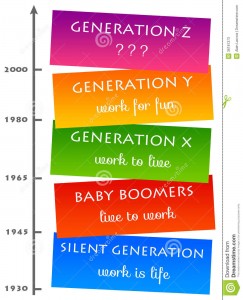Coaching in the workplace – the Generation Game (Part 1)
This week I was reminded of one of my favourite articles written about coaching. Even though it’s three years old it still resonates.
In the piece entitled: ‘Why coaching is the second fastest growing industry in the world’ *(I’m not sure of the first!), writer and Coach Lisa Berkovitz explains that the old script for working and living has been torn up.
But the new terrain has no map or compass – hence the need for a coach to help navigate a way through.
Berkovitz highlights some keys features of this new landscape. Firstly, the traditional world of work is dead, witnessed by increased lack of job security in the corporate world. Yet, at the same time, people are being expected to be more flexible, marketable and more deliberate on how they go about building their careers.
Secondly people’s values are changing. While rapid changes to the working environment frighten some, others are keen to embrace it, seeking greater balance, fulfilment and meaning in what they do. These individuals are looking for more control of life and increased self-determination.
Younger generations might be well-placed to exploit these shifts; older ones less so.
In fact, when we look at the workplace we are heading towards five generations of employable adults, all with different fears, aspirations and levels of adaptability. The breakdown is as follows:
- ‘Traditionalists’, born prior to 1946
- ‘Baby Boomers’, born between 1946 and 1964
- ‘Generation X’, born between 1965 and 1976
- ‘Generation Y/ Millennials’, born between 1977 and 1997
- ‘Generation Z/Generation 2020’, born after 1997
Interestingly, Coach managers, seeking to engage their employees might soon need to be able to relate to all five.
It’s important not to generalise, but there will be significant generational differences, especially in terms of workplace expectation. For example, in a recent Chartered Management Institute report entitled: ‘Management 2020 – Leadership to unlock long-term growth’ ** research revealed that ‘Gen Y’ employees expect high levels of feedback and rapid promotion. The report also pointed out that this generation is ‘wedded’ to social media. The report says : ‘It’s not out of the ordinary for them to be in the meeting room on two screens and they are doing their jobs. They are listening, they are hearing and they are passing on.’
Over the next four weeks I’m going to focus on each workplace generation, to understand how personal experiences, the world of work – past, present and future – is shaping their coaching needs in different ways.
Next week I will focus on both the ‘traditionalists’ and the ‘baby-boomers’







Leave a reply